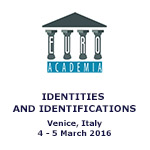Euroacademia Conferences
 Europe Inside-Out: Europe and Europeanness Exposed to Plural Observers (9th Edition) April 24 - 25, 2020
Europe Inside-Out: Europe and Europeanness Exposed to Plural Observers (9th Edition) April 24 - 25, 2020 Identities and Identifications: Politicized Uses of Collective Identities (9th Edition) June 12 - 13, 2020
Identities and Identifications: Politicized Uses of Collective Identities (9th Edition) June 12 - 13, 2020 8th Forum of Critical Studies: Asking Big Questions Again January 24 - 25, 2020
8th Forum of Critical Studies: Asking Big Questions Again January 24 - 25, 2020 Re-Inventing Eastern Europe (7th Edition) December 13 - 14, 2019
Re-Inventing Eastern Europe (7th Edition) December 13 - 14, 2019 The European Union and the Politicization of Europe (8th Edition) October 25 - 26, 2019
The European Union and the Politicization of Europe (8th Edition) October 25 - 26, 2019 Identities and Identifications: Politicized Uses of Collective Identities (8th Edition) June 28 - 29, 2019
Identities and Identifications: Politicized Uses of Collective Identities (8th Edition) June 28 - 29, 2019 The European Union and the Politicization of Europe (7th Edition) January 25 - 26, 2019
The European Union and the Politicization of Europe (7th Edition) January 25 - 26, 2019 7th Forum of Critical Studies: Asking Big Questions Again November 23 - 24, 2018
7th Forum of Critical Studies: Asking Big Questions Again November 23 - 24, 2018 Europe Inside-Out: Europe and Europeanness Exposed to Plural Observers (8th Edition) September 28 - 30, 2018
Europe Inside-Out: Europe and Europeanness Exposed to Plural Observers (8th Edition) September 28 - 30, 2018 Identities and Identifications: Politicized Uses of Collective Identities (7th Edition) June 14 - 15, 2018
Identities and Identifications: Politicized Uses of Collective Identities (7th Edition) June 14 - 15, 2018
How to Be or Not to Be an Iraqi Kurd? Processes of Identity Consolidation beyond National and Ethnic Rhetoric in the Autonomous Region of Kurdistan in Northern Iraq
-
-

-
Presentation speakers
- Silvia-Lucretia Nicola, University of Potsdam, Germany
- Download presentation
Abstract:
With ongoing power struggles in Iraq, apparently only the Kurdistan Regional Government (KRG) constantly managed to consolidate its collective identity both internally and externally over the last decade, throughout three key periods of time (2002-2007; 2007-2011; 2011-2015). This paper aims at presenting the ways both main actors (regional and federal government in Iraq) have nurtured various discourses on identity and on the different types of identities for political purposes and the enforcement of the collective’s own interests. While Iraq has failed in building an overarching national identity, the KRG managed to overcome the “classical pattern” of identity instrumentalization based on ethnical or separatist rhetoric. On the contrary, at least on declarative level, they strive at the consolidation of a collective identity beyond national, regional, ethnical, religious or social movement features. Even if a definitive result cannot be described yet, as it still is an unfolding process, it has been observed, that internationalization has played a decisive role in the KRG’s chosen self-defining path. Notable is also the fact that the KRG’s self-ascription often corresponds with external attributions, thus neutralizing conflict potentials.
-
Related Presentations













